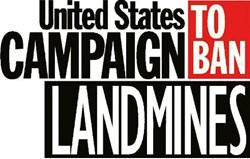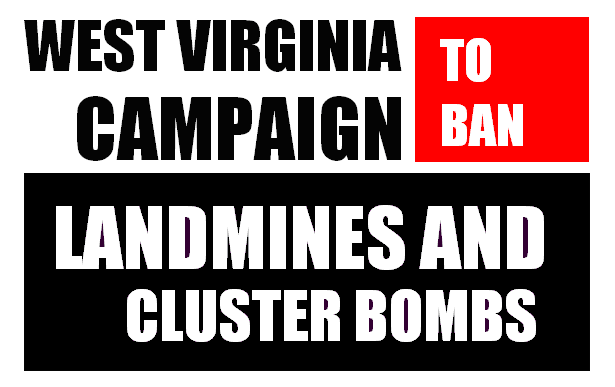
On February 19, the US Campaign to Ban Landmines and the
Anti-Personnel Mine Ban Convention Implementation Support Unit, with
the support of the European Union, held a symposium at the
Carnegie Endowment for International Peace in Washington, DC on the
United States and the Mine Ban Treaty. Senior PSALM students and members of WVCBL attended the event. Speakers
included Nobel Peace Laureate Ms. Jody Williams and Prince Mired Bin
Raad Al-Hussein of Jordan, Special Envoy for the Mine Ban Convention.
In a letter to President Obama, PSALM and members of the US Campaign
to Ban Landmines urged the US to explain its landmine policy review
decision at the Mine Ban Treaty’s Third Review Conference, which opens
in Maputo, Mozambique on June 23, 2014. The US Campaign to Ban
Landmines has repeatedly urged that the outcome of the policy review
be a decision to join the Mine Ban Treaty as soon as possible, to
prohibit the use of antipersonnel mines immediately, and to begin
destruction of all stocks of antipersonnel mines.
The US Campaign to Ban Landmines is the US affiliate of the
International Campaign to Ban Landmines (ICBL), co-laureate together
with former ICBL Coordinator Jody Williams of the 1997 Nobel Peace
Prize.
For years, landmines have killed and wounded innocent people, causing
untold suffering, loss and hardship for thousands in countries across
the world. Landmines continue to claim the land of farmers and the
playgrounds of children. These weapons cause death and injury to
civilians during attacks and for years afterwards. Landmines hamper
post-conflict rebuilding and rehabilitation and the dangerous work of
clearance of these weapons absorbs funds that could be spent on other
urgent humanitarian needs.
In total, 161 countries are States Parties to the 1997 Convention on
the Prohibition of the Use, Stockpiling, Production and Transfer of
Anti-Personnel Mines and on their Destruction (also known as the
Ottawa Convention or Mine Ban Convention/Treaty). Parties include
every member of the European Union, every member of NATO (except the
US), and other key US allies such as Afghanistan, Australia, Iraq, and
Japan. The United States is one of only 35 countries that have not
joined the Mine Ban Treaty and the only country in the Western
Hemisphere aside from Cuba that has not joined. The Clinton
Administration in 1997 set the objective of joining the Mine Ban
Treaty in 2006, but the Bush Administration reversed course in 2004.
The US has not used antipersonnel mines since 1991 (in the first Gulf
War), has not exported them since 1992, has not produced them since
1997, and is the biggest donor to mine clearance programs around the
world. However, it still retains millions of stockpiled antipersonnel
mines for potential future use.
In a January 31, 2014 letter to President Obama, the leadership of
the US Campaign to Ban Landmines reiterated this call and noted that
since the US policy review began in 2009:
* The Obama Administration has received letters of support for the US
to join the Mine Ban Treaty from treaty States Parties, 68 Senators,
16 Nobel Peace Prize Laureates, key NATO allies, senior military
veterans, dozens of leaders from non-governmental organizations
including PSALM, victims of US landmines, and more than 200,000
concerned Americans;
* Mine Ban Treaty special envoy Prince Mired of Jordan and
representatives of the International Campaign to Ban Landmines have
met with US officials in Washington DC and in dozens of capitals
around the world to discuss the need for the US to join the Mine Ban
Treaty;
* The US has participated as an observer in every meeting of the Mine
Ban Treaty since the Second Review Conference in Cartagena, Colombia
in December 2009.
* US officials have expressed concern at new use of antipersonnel
landmines by states not party to the treaty.
During the timeframe of this U.S. review alone, more than 16,000 new
men, women, and children have been killed or maimed by a landmine, and
ten more casualties will continue to occur every day. Many of these
deaths and injuries will be a result of U.S. landmines from conflicts
past.
WVCBL/PSALM students think it is time the U.S. join the treaty. Children
are often injured or killed when their daily activities bring them in
contact with landmines…as they travel to school, play, or help to
contribute to family incomes. PSALM students understand the human
costs of are staggering. Children lose their limbs. Parents lose their
children. Refugees lose their homes or farms. Soldiers lose their
lives. All of us lose because human life is precious. We join people around the world and citizens from all walks of life in calling on ALL COUNTRIES,
especially the United States, to bring about a global ban on
antipersonnel landmines.
About PSALM/WVCBL: St. Francis de Sales PSALM: PROUD STUDENTS AGAINST
LANDMINES and CLUSTER BOMBS/WVCBL: West Virginia Campaign to Ban
Landmines and Cluster Bombs are students and citizens who for 15 years
have been committed to educating the public about the devastation
caused by landmines and cluster munitions and the indiscriminate
nature of these weapons leading to the destruction of innocent life,
especially children, after wartime hostilities have ceased. We work to
assist survivors, to prevent future casualties through our service
projects, and contribute to the universal signature of the treaties
banning landmines and cluster munitions by ALL countries.
For information/research:
United States Campaign to Ban Landmines: www.banminesusa.org
International Campaign to Ban Landmines: www.icbl.org
Cluster Munition Coalition: www.stopclustermunitions.org
West Virginia Campaign to Ban Landmines and Cluster Bombs: www.wvcbl.org
For more information, see:
* US Campaign to Ban Landmines letter to President Obama, January 31,
2014: http://www.uscbl.org/fileadmin/content/images/Letters/USCBL_Letter_to_Obama_31Jan2014.pdf
* United States and the Mine Ban Treaty event, February 19, 2014:
http://uscbl.org/fileadmin/content/images/Press_Releases/USCBL_Event_Invitation__19_February_2014.pdf
Please visit www.banminesusa.org
Follow on Facebook at: www.facebook.com/banminesusa
Follow on Twitter at: @BanMinesUSA
For more information, please contact in Washington DC:
Steve Goose, Human Rights Watch: +1-202-612-4355 or +1-540-630-3011
(mobile); or [email protected]
Mica Bevington, Handicap International, +1-240-450-3531; or
[email protected]
WASHINGTON, DC: President Barack Obama should promptly conclude the administration’s review of US policy on banning antipersonnel landmines and announce a decision to join the 1997 Mine Ban Treaty. A decision is believed to be imminent on the US landmine policy review, which began in 2009.
“A decision by the Obama Administration to ban landmines now is long-overdue,” said Steve Goose of Human Rights Watch, chair of the United States Campaign to Ban Landmines, a coalition of more than 400 non-governmental organizations. “US support would help to convince other countries that have not joined the treaty to reconsider their stance. It would strengthen the norm against these weapons by helping to ensure they are not used in the future.”

In total, 161 countries are States Parties to the 1997 Convention on the Prohibition of the Use, Stockpiling, Production and Transfer of Anti-Personnel Mines and on their Destruction (also known as the Ottawa Convention or Mine Ban Convention/Treaty). Parties include every member of the European Union, every member of NATO (except the US), and other key US allies such as Afghanistan, Australia, Iraq, and Japan. The United States is one of only 35 countries that have not joined the Mine Ban Treaty and the only country in the Western Hemisphere aside from Cuba that has not joined.
The Clinton Administration in 1997 set the objective of joining the Mine Ban Treaty in 2006, but the Bush Administration reversed course in 2004. The US has not used antipersonnel mines since 1991 (in the first Gulf War), has not exported them since 1992, has not produced them since 1997, and is the biggest donor to mine clearance programs around the world. However, it still retains millions of stockpiled antipersonnel mines for potential future use.
The US Campaign to Ban Landmines has repeatedly urged that the outcome of the policy review be a decision to join the Mine Ban Treaty as soon as possible, to prohibit the use of antipersonnel mines immediately, and to begin destruction of all stocks of antipersonnel mines. In a January 31, 2014 letter to President Obama, the leadership of the US Campaign to Ban Landmines reiterated this call and noted that since the US policy review began in 2009:
– The Obama Administration has received letters of support for the US to join the Mine Ban Treaty from treaty States Parties, 68 Senators, 16 Nobel Peace Prize Laureates, key NATO allies, senior military veterans, dozens of leaders from non-governmental organizations, victims of US landmines, and more than 200,000 concerned Americans;
– Mine Ban Treaty special envoy Prince Mired of Jordan and representatives of the International Campaign to Ban Landmines have met with US officials in Washington DC and in dozens of capitals around the world to discuss the need for the US to join the Mine Ban Treaty;
– The US has participated as an observer in every meeting of the Mine Ban Treaty since the Second Review Conference in Cartagena, Colombia in December 2009.
– US officials have expressed concern at new use of antipersonnel landmines by states not party to the treaty.
“It’s clear that there is widespread support for the United States to do the right thing on landmines and relinquish these weapons,” said Goose. “Acceding to the treaty would reinforce President Obama’s stated commitment to international humanitarian law, protection of civilians, arms control and disarmament, and multilateralism.”
In the letter to President Obama, the US Campaign to Ban Landmines urges the US to explain its landmine policy review decision at the Mine Ban Treaty’s Third Review Conference, which opens in Maputo, Mozambique on June 23, 2014.
The US Campaign to Ban Landmines is the US affiliate of the International Campaign to Ban Landmines (ICBL), co-laureate together with former ICBL Coordinator Jody Williams of the 1997 Nobel Peace Prize.
On Wednesday, February 19, the US Campaign to Ban Landmines and the Anti-Personnel Mine Ban Convention Implementation Support Unit, with the support of the European Union, are holding an event at the Carnegie Endowment for International Peace in Washington, DC on the United States and the Mine Ban Treaty. Confirmed speakers include Nobel Peace Laureate Ms. Jody Williams and Prince Mired Bin Raad Al-Hussein of Jordan, Special Envoy for the Mine Ban Convention.
For more information, see:
– US Campaign to Ban Landmines letter to President Obama, January 31, 2014: http://www.uscbl.org/fileadmin/content/images/Letters/USCBL_Letter_to_Obama_31Jan2014.pdf
– United States and the Mine Ban Treaty event, February 19, 2014: http://uscbl.org/fileadmin/content/images/Press_Releases/USCBL_Event_Invitation__19_February_2014.pdf
Please visit www.banminesusa.org
Follow on Facebook at: www.facebook.com/banminesusa
Follow on Twitter at: @BanMinesUSA
For more information, please contact in Washington DC:
Steve Goose, Human Rights Watch: +1-202-612-4355 or +1-540-630-3011 (mobile); or [email protected]
Mica Bevington, Handicap International, +1-240-450-3531; or [email protected]

